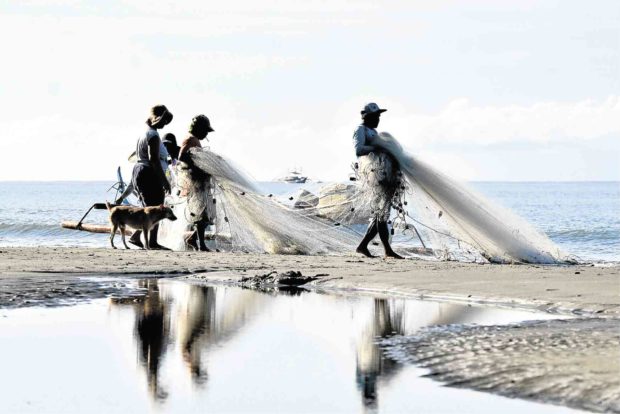Fish prices continue to decline after gov’t ends closed fishing season

(File) CLOSED SEASON NO MORE Fishermen in Davao City clean their nets as they prepare to take a breather following the declaration of a closed fishing season in Davao Gulf. The government lifted the closed fishing season thus, bringing down the prices of fish varieties in the local market. INQUIRER file photo / ARJOY CENIZA
MANILA, Philippines — Prices of local fish variants in Metro Manila have been steadily declining following the lifting of the three-month closed fishing seasons in the country’s major fishing grounds.
Most notable is the price of galunggong (roundscad) that decreased to P180 a kilogram from a high of P280 a kilo.
Prices of bangus and tilapia per kilo also stabilized at P160 and P120, respectively.
Between March 1 and 15, the Philippine Fisheries Development Authority reported an increase in the fish unloaded at the Navotas Fish Port Complex to 9,506 metric tons (MT).
In just two weeks, the volume is already seen to surpass the record in January at 12,404 MT and in and February at 15,385 MT.
The majority of the fish unloaded were galunggong followed by bangus (milkfish), tilapia (black cap), tulingan, and tamban.
“With the resumption of large supplies of fresh marine commodities in the market, our consumers now have more affordable fish to choose from and put on their tables,” said Agriculture Undersecretary for Fisheries Cheryl Caballero.
“We had continuous aquaculture production in the past months and this helped us augment supply during our lean months.”
The Bureau of Fisheries and Aquatic Resources implements closed fishing seasons in the country’s major fishing areas to give seas ample time to revitalize and allow fish variants to spawn.
In the Visayan Sea where herring, mackerel, and sardines thrive, the closure happens between November and February.
In the Zamboanga Peninsula, it is between December and March. In Northeast Palawan where about 90 percent of Manila’s galunggong supply comes from, the closed season is between November and January.
The Davao Gulf is also subjected to the same rules between June and August to allow tuna species to spawn.
Studies have pointed out that the closed-fishing seasons could ensure the abundance and productivity of the country’s marine resources in the long run.
While closed fishing seasons were mandated by law since 1989, it was only in late 2012 that BFAR was able to implement it fully.